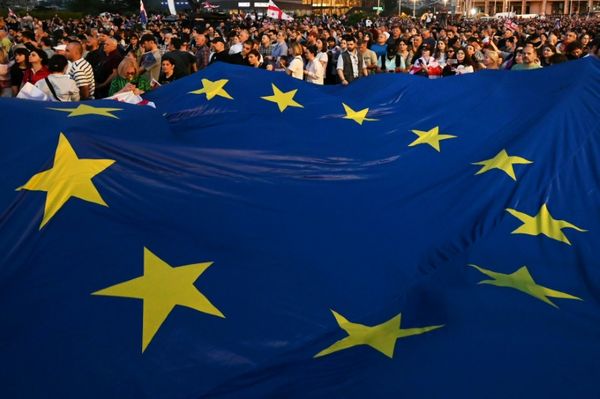
Leading players in Georgia’s national men’s football team have backed mass protests sparked by a “foreign influence” bill criticised for mirroring a repressive Russian law.
Riot police have clashed in recent nights with large rallies of people protesting outside the parliament building in Tbilisi against the bill, which is viewed in Brussels as a threat to future EU membership.
Jaba Kankava, the captain of Georgia’s national football team, which recently qualified for Euro 2024, its first major tournament, posted a picture on Instagram of two protesters staring down riot police on Tuesday night, adding: “Fuck Russia.”
A host of other national team players, including Khvicha Kvaratskhelia, a winger for Italy’s Serie A club Napoli, and Giorgi Mamardashvili, who is a goalkeeper for Valencia in Spain’s La Liga, also posted what appeared to be coordinated messages on social media.
They wrote: “Georgia’s path is to Europe. The European way unites us!! Forward to Europe!! Peace to Georgia.”
David Kezerashvili, who served as Georgia’s defence minister at the time of the 2008 Russian invasion of the country, said: “The footballers’ decision to back the protests may prove to be a decisive intervention, coming just weeks after millions took to the streets to celebrate their Euro 2024 qualification.
“People understand the economic benefits and freedoms that membership of the European Union would bring to a country like Georgia, and they resent those aspirations being sabotaged. Seeing police in balaclavas take violent action against well-meaning protesters has dark echoes of Georgia’s Soviet past. This is driving a wedge between Tbilisi and Brussels.”
Under a draft bill introduced to parliament on Monday, organisations receiving more than 20% of their funding from abroad will be required to register as being agents of foreign influence, with fines for those who do not comply.
The law has been likened to Russian legislation under which journalists, politicians, rights organisations, environmental groups, LGBTQ support networks and others have been obliged to label themselves as “foreign agents” when they publish.
The legislation has provoked violence inside and outside the parliament building. Footage broadcast on Monday on Georgian television showed Mamuka Mdinaradze, the leader of the ruling Georgian Dream party’s parliamentary faction and a driving force behind the bill, being punched in the face by the opposition MP Aleko Elisashvili while speaking from the dispatch box.
Crowds of about 10,000 people protested outside the parliament building in Tbilisi on Monday and Tuesday night, when they clashed with riot police.
Despite the protests, 83 out of 150 deputies voted in favour of the bill on Wednesday, which must pass two more readings before becoming law. The ruling Georgian Dream party says the legislation is needed to promote transparency and combat “pseudo-liberal values” imposed from abroad.
Georgia’s prime minister, Irakli Kobakhidze, said he would not back down.
He said: “As for the west, the opposition talked about this as if we consider the west as an enemy. I will repeat once again that transparency is not a criterion for distinguishing between enemies and friends. First of all, of course, a friend should be transparent, this is the friends’ responsibility before the Georgian public.”
A spokesperson for the European Commission condemned the legislation as a risk to media and civil society freedoms. The EU gave Georgia candidate status in December.
The commission spokesperson said: “This is a very concerning development and the final adoption of this legislation would negatively impact Georgia’s progress on its EU path. This law is not in line with EU core norms and values.”
The Georgian president, Salome Zurabishvili, who is at loggerheads with the ruling party, has offered her support to the protesters, denouncing the proposed bill as “a Russian strategy of destabilisation”.
A similar bill targeting “foreign agents” was dropped last year after two nights of mass protests.
The Kremlin spokesperson, Dmitry Peskov, said that Russia had nothing to do with the foreign agents bill, which he described as “normal practice” for a government that wished to “protect themselves from outside influence”.
He claimed that the law was being used to “provoke anti-Russian sentiments” and that “it is unlikely that these impulses are being fed from within Georgia”.
“They’re probably coming from the outside,” he said.







